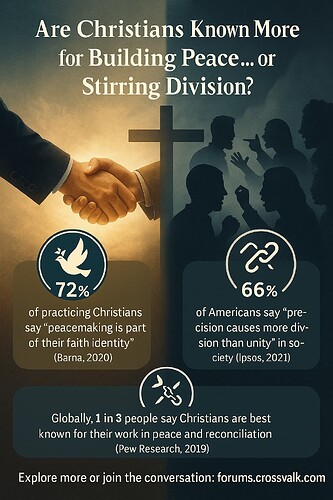Are Christians Known More for Building Peace... or Stirring Division?
Around the world, Christianity is often associated with love, unity, and reconciliation—but just as often, critics point to moments of division, culture wars, and conflict tied to the church. Which image truly defines us today?
#ChristianWitness #Peacemakers #FaithAndDivision #christianforums #crosswalkforums #forums #crosswalk #faithcommunity #faithforums
Jesus called His followers to be peacemakers, even blessing those who bring reconciliation (Matthew 5:9). The Apostle Paul echoed this by urging Christians to live “as far as it depends on you, be at peace with everyone” (Romans 12:18). Yet the reality of Christian witness in today’s world often tells a more complicated story.
In the public eye, some Christians are seen as defenders of truth who stand firm when culture drifts from biblical values. Others, however, are portrayed as combative, divisive, or more concerned with winning arguments than extending grace. Inside churches, the same tension exists—believers long for unity, yet often split over politics, worship styles, leadership disputes, or differing theological convictions.
History adds another layer. From the early church councils to the Reformation to modern denominational splits, division has frequently marked the church’s path. And yet, those same centuries are filled with Christian-led movements of peace, reconciliation, and healing—whether in communities, across nations, or within families.
This leaves us with an uncomfortable but important question: in the eyes of the world, are Christians known more for peace or for conflict? And perhaps even more critically, how do we as individuals and communities shape that reputation through the way we live, speak, and engage?
Is pursuing peace always the same as compromising truth? Or can the two walk hand in hand in a way that reflects Christ’s character to a watching world?
Watch here:


